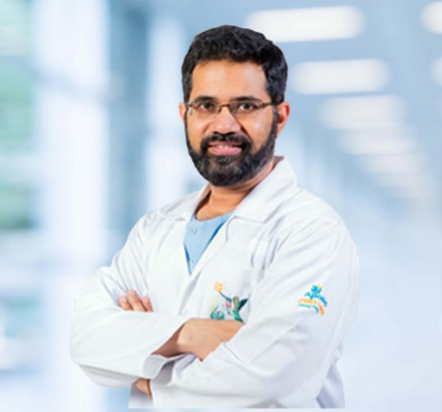Dr. Arvind Sukumaran
Snapshot Highlights
- Over 14 years of neurosurgical practice post-training
- Fellowship-trained in Pediatric Neurosurgery and Epilepsy/Functional Neurosurgery from the University of Calgary, Canada
- Proficient in over 4000 neurological surgeries, equally split between spine and brain
- Pioneered and patented low-cost fluorescence-guided glioma surgeries
- Recognized for bringing innovative techniques like LITT and robotic stereotactic EEG to India
Introduction to Expertise
Dr. Arvind Sukumaran is a highly accomplished neurosurgeon with an extensive background in complex neurological procedures. His distinguished career, spanning over 14 years after completing his neurosurgical training at the National Institute of Mental Health and Neurosciences (NIMHANS), Bangalore, is marked by a commitment to advancing neurosurgical care. He further honed his skills through accredited fellowship training in Paediatric Neurosurgery and Epilepsy/Functional Neurosurgery at the esteemed University of Calgary, Canada.
Surgical Proficiency and Specializations
Dr. Sukumaran has successfully performed more than 4000 neurological surgeries, demonstrating exceptional skill and experience in both spinal and brain procedures. He is among a select group of surgeons in India adept at performing highly specialized and innovative surgeries. These include deep brain stimulation (DBS) for movement disorders and functional neurosurgery applications, complex epilepsy surgeries, spasticity surgeries, endoscopic and open craniosynostosis surgery, awake craniotomy, and fluorescence-guided tumor resections. His expertise extends to cutting-edge treatments such as Laser Interstitial Thermal Therapy (LITT) and robotic stereotactic EEG placement, areas he is actively working to introduce in India.
Innovation and Academic Contributions
A testament to his innovative spirit, Dr. Sukumaran has pioneered and patented low-cost fluorescence-guided glioma surgeries, showcasing his original thinking and dedication to accessible advanced treatments. His contributions to the field are further evidenced by his numerous presentations at national and international conferences, his leadership in conducting workshops, and his extensive academic publications. He has also played a key role in organizing international conferences and has had his educational videos featured on international platforms. Dr. Sukumaran is also dedicated to raising public awareness about rare neurological diseases through active media engagement.
Patient-Centric Approach and Healthcare Philosophy
With a steadfast patient-centric focus, Dr. Arvind Sukumaran seamlessly integrates his profound expertise with accessibility to provide a holistic approach to patient care. He believes in delivering high-quality, affordable healthcare by employing cost-conscious and judicious resource management, coupled with a strong emphasis on complication avoidance, all within a setting that offers best-in-class infrastructure.
Areas of Specific Interest and Unique Expertise
Dr. Sukumaran’s specialized interests and unique expertise encompass several critical areas of neurosurgery:
- Neuro-oncology: Specializing in awake surgeries, fluorescence-guided resection for intra-axial lesions like glioblastoma, and complex skull base tumors (cranial and endonasal endoscopic), including meningiomas, schwannomas, and chordomas.
- Functional Neurosurgery: Expertise in deep brain stimulation for Parkinson’s disease, dystonia, and OCD; spasticity surgeries (rhizotomy, intrathecal baclofen pump therapy); sacral neuromodulation; spinal cord stimulation; and the implantation of programmable VP shunts.
- Epilepsy Surgery: Proficient in ECoG-guided resections, functional hemispherotomy and quadrantectomy, vagal nerve stimulation, corpus callosotomy, and temporal lobectomy.
- Pediatric Neurosurgery: Comprehensive care for hydrocephalus (open shunt and endoscopic procedures), spinal dysraphism (spina bifida), spasticity management, craniosynostosis and craniofacial diseases (open and endoscopic), pediatric tumors, and craniovertebral junction anomalies.
